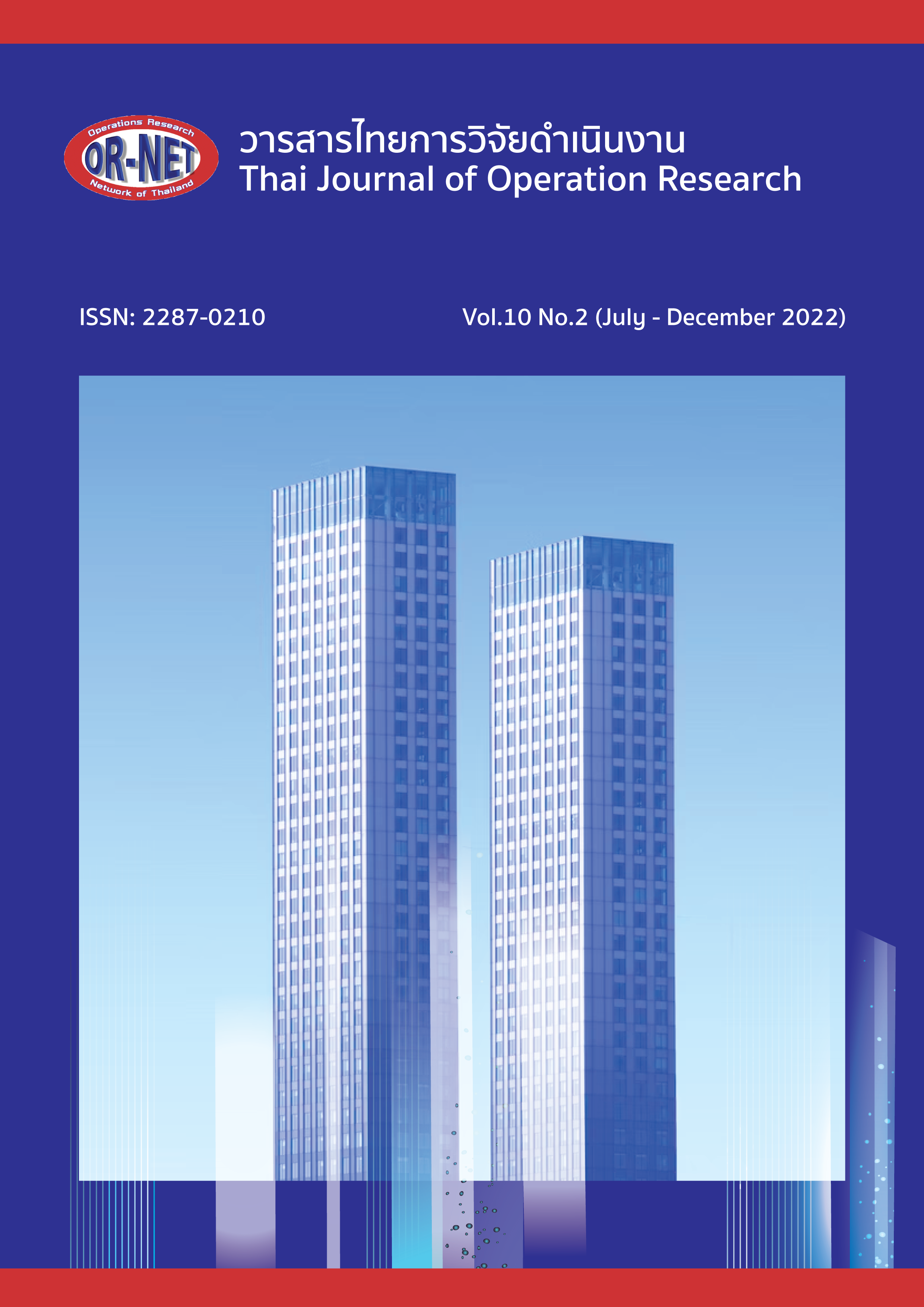Application of Integer Programming for Aggregate Production Planning in the Production and Purchase of Vaccines
Keywords:
aggregate production planning, integer programming, vaccine manufacturing process, Covid-19Abstract
Infectious diseases caused by viruses have been reported across the world. These include seasonal diseases like influenza and emerging diseases such as COVID-19. The vaccine is one of the effective tools to control a virus pandemic among the population by preventing virus infection, reducing the severity of illness, and reducing the mortality rate. The Government Pharmaceutical Organization (GPO) is a state enterprise operated under the Ministry of Public Health, with a mission to supply medicines, medical devices, and vaccines. GPO has a policy of vaccine production to reduce the importing of vaccines and to establish vaccine security in Thailand. As part of the GPO, the biological product (Vaccine) production plant has employed an egg-based platform for the manufacture of vaccines, which presently includes trivalent seasonal influenza vaccine, quadrivalent seasonal influenza vaccine, and COVID-19 vaccine. However, the production capacity is limited. To fulfill the domestic demand for vaccines, imported vaccines have been widely used. This paper aims to propose a mathematical model by employing integer programming to generate a quarterly aggregate production plan for three vaccines. The objective of the proposed model is to minimize the total production cost and import cost under capacity and inventory constraints. The results show the effectiveness of the proposed model and that the manufacturing costs of those vaccines are sensitive to the amount of vaccine production and imported vaccines during the planning period.
References
K. Rezaie, S. Nazari-Shirkouhi and R. Ghodsi, “Theory of constraints and particle swarm optimization approaches for product mix problem decision,” Australian Journal of Basic and Applied Science., vol. 4, no. 12, pp. 6483-6491, 2010.
S. C. K. Chu, “A mathematical programming approach towards optimized master production scheduling,” International Journal of Production Economics., vol. 38, no. 2, pp. 269-279, 1995.
S. Wattitham, T. Somboonwiwat and S. Prombanpong, “Master production scheduling for the production planning in the pharmaceutical industry,” Industrial Engineering, Management Science and Applications., vol. 349, pp. 267-276, 2015.
R. Venkataraman and J. Nathan, “Master production scheduling for a process industry environment,” International Journal of Operations & Production Management., vol. 14, no. 10, pp. 44–53, 1994.
R. T. McIvor and P. K. Humphreys, “A case‐based reasoning approach to the make or buy decision,” Integrated Manufacturing Systems., vol. 11, no. 5, pp. 295–310, 2000.
S. Chaoleam, T. Somboonwiwat and S. Prombanpong, “The Production Planning of Pharmaceutical Production Under Multi Vriables,” in International Conference on Industrial Engineering and Engineering Management, Thailand, 2013.
B. P. Das, J. G. Rickard, N. Shah and S. Macchietto, “An investigation on integration of aggregate production planning, master production scheduling and short-term production scheduling of batch process operations through a common data model,” Computers & Chemical Engineering., vol. 24, pp. 1625-1631, 2000.
M. Trost, T. Claus and F. Herrmann, “Employment of Temporary Workers and Use of Overtime to Achieve Volume Flexibility using Master Production Scheduling: Monetary and Social Implications,” in the 35th International ECMS Conference on Modelling and Simulation, Kuwait, 2021.
E. T. Valencia, S. Moussavi, S. Lamouri, R. Pellerin, and A. Moeuf, “An Optimization Approach for MPS in a MTO Multiproduct Assembly Line System,” in the 8th International Conference on Industrial Engineering and Systems Management, China, 2019.
E. J. Blocher, D. E. Stout, P. E. Juras and S. Smith, Cost Management: A Strategic Emphasis, 8th ed., New York: McGraw-Hill Education, 2019.
J. S. Zuk, “Techniques for Effective Product Costing in an IC Manufacturing Facility,” in IEEE/SEMI International Symposium on Semiconductor Manufacturing Science, United State of America, 1990.
X. Li, G. Hengfa and C. Siyuan, “Extension intelligence for process manufacturing,” Journal of Physics., vol. 1605, no. 1, pp. 12046, 2020.
Downloads
Published
How to Cite
Issue
Section
License

This work is licensed under a Creative Commons Attribution-NonCommercial-NoDerivatives 4.0 International License.




